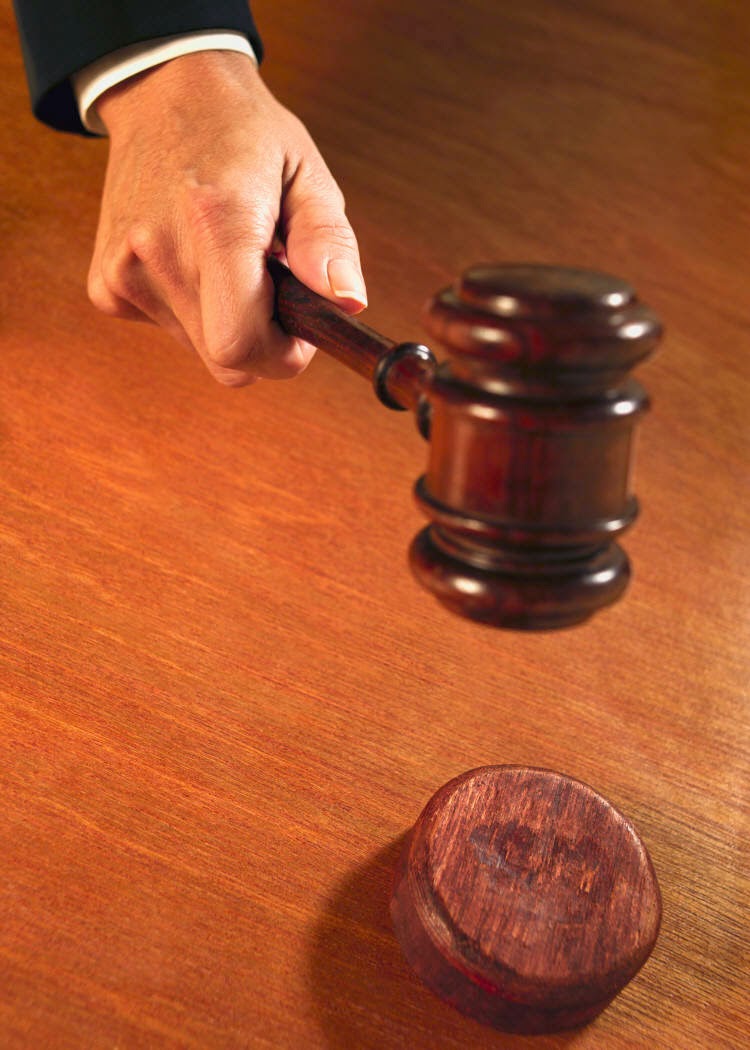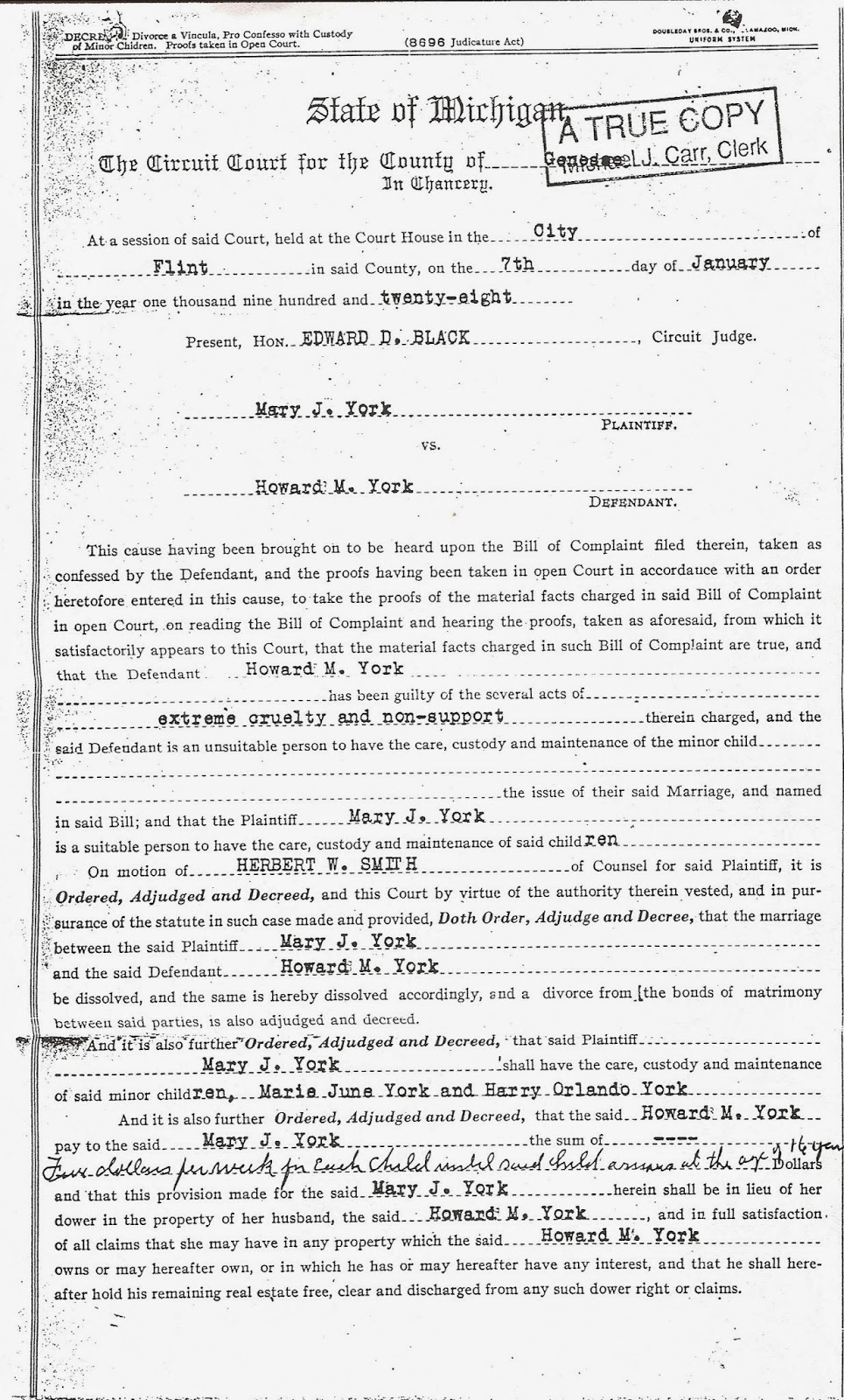 |
| Image from Microsoft Clip Art |
I'm no expert on divorce records, but I have had the opportunity to obtain and analyze a variety of them for a number of my ancestors. I'd like to share a few tips that I've discovered. If you have any of your own, please feel free to post them in the comments below.
1) Learn about the divorce laws in existence at the time and place your ancestors lived. Red Book: American State, County & Town Resources, The Source: A Guidebook Of American Genealogy, and
The Handybook for Genealogists: United States of America are all classic U.S. resources available at most public and genealogical libraries. The Red Book is also available on Ancestry's Wiki
2) Understand that there really were more divorces in the past than we realize or would like to admit. This ties into Tips 5 and 8. While statistically, the percentages were much lower than today, much of that was due not just to societal norms and religious frownings upon divorce, but to the fact that the laws really discouraged--and in some cases completely prohibited--divorce. People were not more saintly in the past than they are in the present. Remember that in the big picture of history, women were considered little more than the property of their fathers or husbands. It could be very difficult, socially, legally, and financially for a woman to show just cause for divorce, such as adultery, drunkenness, non-support, and physical abuse. It was much easier for a man to divorce his wife than the reverse. However, women DID divorce their husbands successfully and the records prevail to prove this.
3) There are many divorce records and indexes online. Joe Beine, the webmaster of DeathIndexes.com has a great list of divorce records (mixed with marriage and birth records) here. Cyndi's List has multiple categories under "Marriages & Divorces" to help you find records online and offline, as well as articles and guides for those who are new to divorce research. Don't forget to check out online newspapers for legal notices, gossip columns, and local news items mentioning a pending or completed divorce.
4) There are even more divorce records and indexes OFFline. Categorize this under "Not everything is on the Internet, nor will it all eventually get there." For very early divorces, generally before the mid-1800s, check the state's records, especially indexes of the state congressional journals for dissolutions of marriage, divorces, private acts, or the couple's surname. Otherwise, check with the state's Department of Vital Statistics and the county's civil court records. An essential resource is Christine Rose's Courthouse Research for Family Historians: Your Guide to Genealogical Treasures. Chapter 9, "Civil and Criminal Court," is especially helpful. Offline newspapers (microfilmed or archived hard copies) are also a good resource.
5) Compare marriage dates to divorce dates and check out EVERY marriage and divorce for EVERY partner. This gets complicated when you have an individual who married and divorced multiple times, because it's likely that most of their partners also did so. You could have a good dozen marriages and divorces that spin off from your original divorced ancestral couple. It always amazes me how soon after a divorce was granted that a person turned around and remarried someone else. Obviously, they were just waiting for that divorce decree to come through so they could marry their next
6) Realize that everyone who got "married" may not have because they couldn't/didn't get a divorce from their last partner. I'm currently looking at an ancestor who purportedly was married four times. The first marriage, to my ancestor, ended with his death at a young age. My female ancestor then married a second time, but divorced that husband. She married a third time, but I am unable to find a divorce record for that couple. She then supposedly married her fourth husband in 1922. Interestingly enough, I can't find a divorce record for her fourth "husband" and his last known spouse, his second wife. My female ancestor and her fourth "husband" are found living with one of her sons in the 1930 census, and another one of her sons in the 1940 census. In both cases, the fourth "husband" is listed as "widowed" and a "boarder," while my female ancestor is also listed as "widowed" and is enumerated with her first husband's surname, and not her "husband's." At this point, I truly believe my female ancestor and her fourth "husband" never were legally married, although her death certificate and tombstone give his surname as her last name. P.S. In many census records, divorced people were listed as "widowed," or "married" but living separately from their spouses.
7) Check out "annulments." A brother of one of my direct ancestors was said to have had an annulment before he married his wife, with whom he had a long and happy marriage. Interestingly enough, that "annulment" shows up in an online divorce database, without images. Until I can get my hands on a copy of the actual record, I'm not certain it really was an annulment. Regardless, check divorce databases and indexes, as annulments may be listed with them.
8) Run EVERYONE's name in that time period and place through the divorce database or a printed index. I guarantee you will come across some surprises. Use the handy "find" or "search" features of your genealogy database to generate a list of these individuals.
9) There is more than one kind of divorce record. As with any genealogical event, the more records you find for it, the better idea you'll have of the big picture. For example, I have the following photocopy of the divorce decree for my great-grandparents, Howard Merkel and Mary Jane (BARBER) YORK that I obtained from the Genesee County, Michigan Clerk:
Click on any of the following images to enlarge:
Finally, I obtained a 12-page document from the Superior Court of Grand Rapids, Michigan in Chancery for my maternal grandfather's divorce from his first wife. I won't post the images here, but it was a wealth of information including the official Bill of Complaint of the first wife, sworn testimony of the first wife as well as her mother's, and the detailed order with a Dower Clause and custody order for their child.
In all these documents, take time to check the details, especially the date and location of the marriage (which I have found to be slightly off or quite incorrect in a small percentage of the cases I've examined), the number of children they may have had (which should lead you to custody information), and mentions of property (leading to deeds, sales, and other court records).
10) People lie in divorce proceedings, or omit/withhold important information to their own advantage. I know this comes as a great shock to you that your ancestors could actually make false statements or accusations against their spouses, or that they might not state all their activities if it made them look bad. So if you get a transcript of the proceedings, read them with the knowledge that not everything that was stated actually was true, or that there might be some important details left out.
11) Get familiar with terminology. When I first read the term "extreme cruelty" years ago in Howard and Mary Jane York's divorce decree, I assumed Howard had been horrendously and physically abusive to Mary Jane. However, as I have analyzed records over the years, I have come to realize that "extreme cruelty" generally means physical or mental harm and in many of the cases I've analyzed, it was related to accusations of adultery where one spouse purportedly flaunted their unfaithfulness or it was generally known by the community. "Next friend" is another term I have seen, which means another person stood in for the plaintiff or defendant because that person either was a minor or incompetent. In both cases I've seen, the "next friend" was the father of the wife in the divorce, who happened to be under the age of 21. A wonderful resource for legal terminology is Judy Russell's The Legal Genealogist; it's a must-read genealogy blog!
Bonus Tip: Find out where the "divorce meccas" were for your ancestral locations. Just like some locations were Gretna Greens, where people ran off to get married, others were Divorce Meccas because of short waiting times and short or no residency requirements. Las Vegas is a prime example. For my own Spokane County, Davenport, the county seat in neighboring Lincoln County, Washington, is a Divorce Mecca. Not only is there a shorter waiting time, probably because of a less backed-up, smaller court system, but the divorces granted there are not published in the Spokane paper, which may help those hoping to avoid publicity. The local genealogical society in your ancestral location is sure to know where the nearest Divorce Mecca is.
Beyond the desire to uncover a delicious family scandal (admit it, you like finding these!), divorce records can give insight to some of the subsequent actions and events that occurred in the lives of our ancestors, as well as their children's lives: statistically, children of divorce are more likely to divorce, themselves. More importantly, it should give us empathy and compassion for what were surely traumatizing and perhaps humiliating circumstances at a time when to get a divorce often meant social and religious ostracism. Much luck to you in uncovering these records and getting to know your ancestors just a little bit better!
Disclosure: I am an affiliate for Ancestry.com and Amazon.com, and as such, receive compensation for products advertised on and linked from this blog.




6 comments:
Nice post, Marian. I read it with my inability to find Naturalization Records to see if I had left a stone unturned. Not so far, but your blog gave me confidence that I was looking in the right places.
Thank you, Jill. I wish you much success in locating your ancestor's naturalization record.
A great post!
Thank you for reading!
My great grandparents divorced in Philadelphia, 1910. Apparently, those records are sealed for all time. Dk you have any recommendations for me?
I have not seen information that Philadelphia divorce records are sealed for all time, but that doesn't mean it isn't so.
I suggest you contact the Office of Judicial Records and order a copy of the Divorce Decree. There is also contact information on this form, so you could direct any questions you have there.
https://www.courts.phila.gov/pdf/manuals/ojr/INSTRUCTIONS-TO-OBTAIN-CERTIFIED-COPY-DIVORCE-DECREES.pdf
Best of luck!
Post a Comment